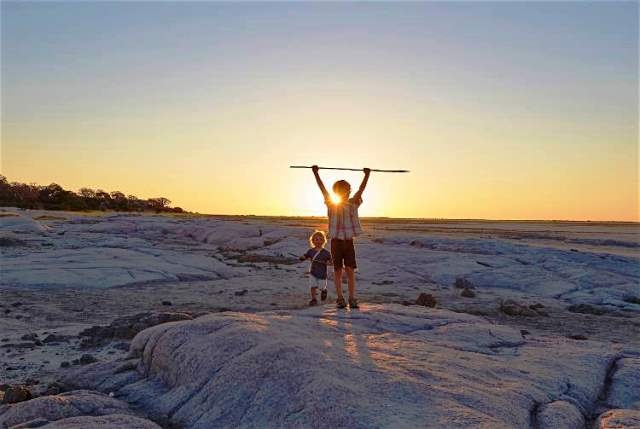Developments started in 2017 and are still ongoing.
Report about activities in 2022
Comments from parents in 2019.
EARLY DEVELOPMENTS:
In 2017, a new and very promising ICDP initiative was developing in Botswana with the involvement of a well-established local organization, the NGO “Ark and Mark”, as ICDP’s new partner. Ark and Mark has government backing and it was hoped that the work of ICDP would eventually become sustainable by being recognized by the government.
2017: Several members of the staff in Ark and Mark have started ICDP training to become facilitators, along with some of the key members of the local community. At a later stage they will conduct an ICDP pilot project by introducing the method with caregivers in a town outside Gaborone. ICDP trainers, are Patrick O’Loughlin and Chiku Ali will run the training.
“The head of Ark and Mark has just completed her PhD at Bergen University and is a strong professional colleague. Indeed she and colleagues, supported by a professor in the faculty of Psychology, Bergen University, will monitor and evaluate implementation. We are particularly concerned to introduce ICDP in a form appropriate to the local context, while maintaining the essential content. Our Centre in Bergen will cover travel and all other costs for Chiku Ali and my work. This is a generous offer from our centre which has a mandate to deliver services in Western Norway, but we believe we will bring valuable experience and learning back to our work, ICDP and otherwise, with refugees and ethnic minorities in Norway. Ark and Mark do not have a lot of funds but can cover all local costs.“ – Patrick O’Loughlin, psychologist at the RVTS trauma centre in Bergen (RVTS, Ressurssenter om vald, traumatisk stress og sjølvmordsførebygging)
From Patrick’s report:
” In February 2017, trainer Chiku Ali (Tanzania) and I ran an initial training of ICDP facilitators in Thamaga, one hour’s drive from the capital of Botswana.
Ark and Mark used their extensive contacts with different stakeholders in the local community and professionals serving the area to recruit 36 participants. These come from a wide range of backgrounds including the regional head of social work and social worker colleagues, teacher-counsellors, local government officials, church pastors, coach of football/sports teams, farmers, grandparents, parents, young parents and youth.
Because of the long distance between the trainers’ base (Norway) and the training site, it was decided to intensify the training and deliver all six training days in the space of two weeks (see figure showing whole training programme). We soon realized that this worked very well. One example of this was that trainees sent in their films of interactions with a child within three days of the first training sessions and we were able to see nearly all the films during the second week.
Some trainees have had to drop out of the programme due to moving location, job change, pressure of other responsibilities (including the urgent need to tend to farm lands) etc. The majority remain in the programme and have participated in supervision sessions via Skype. These have worked very well, again because Ark and Mark staff have taken a lot of responsibility for all the practical details, including covering transport costs so that all trainees can attend Skype sessions in Ark and Mark’s offices in Gaborone.
We are on target to complete the training in early July and are now planning a concluding 3-day seminar, 10th. – 12th. July, with built in final supervision and some further training on topics such as, trauma-sensitive approaches to working with parents. This seminar will also be used to collate experiences from the trainee facilitators and examples of challenges reported by parents in Thamaga and possible, appropriate solutions.”

